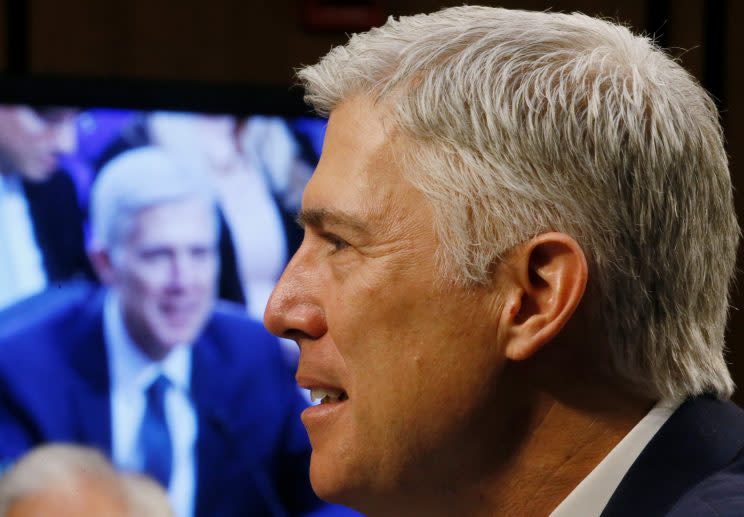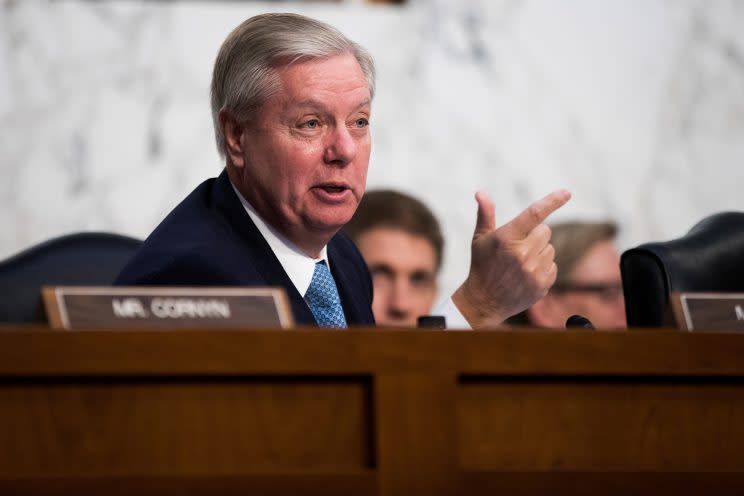Chuck Schumer says Democrats will filibuster Neil Gorsuch
WASHINGTON — Sen. Chuck Schumer, D-N.Y. threatened to block Neil Gorsuch’s nomination to the Supreme Court in a blistering Senate floor speech Thursday, saying he did not want to confirm a justice who appeared to have “ice water in his veins.”
Republicans have said they will change Senate rules to end the 60-vote floor for voting on Supreme Court nominees if Democrats block President Donald Trump’s nominee. But Schumer brushed off that threat Thursday.
“If this nominee cannot earn 60 votes—a bar met by each of President Obama’s nominees and President Bush’s nominees—the answer is not to change the rules, it’s to change the nominee,” Schumer said.
It’s unclear if the Senate Minority Leader has the Democrats to back up his threat, however. His staff said they do not have a current whip count of “no” votes. It would only take eight Democrats to side with Republicans to end a filibuster and allow a vote on Gorsuch. Sen. Bob Casey, D-Ohio, announced today he would vote no on cloture for Gorsuch.
In early January, Schumer said he would “absolutely” do his best to keep Justice Antonin Scalia’s vacated Supreme Court seat open because he viewed it as a stolen seat. The Republican-controlled Senate refused to hold a hearing for Barack Obama’s appointee Merrick Garland with 10 months left in the former president’s tenure, a subject Senate Democrats are still angry about and frequently brought up during Gorsuch’s hearing.
Several Senate Democrats, including Schumer, have since said they would insist on a 60-vote “standard” for Gorsuch, suggesting they would demand Trump’s nominee get at least some Democratic votes to end debate on his nomination before he could be confirmed. Republicans have 52 votes in the Senate — enough to confirm Gorsuch once the 60-vote threshold to end debate has been met.
Republicans on the Judiciary Committee chastised Democrats in advance for even considering filibustering Gorsuch, noting that they could have blocked a vote on Obama Supreme Court nominee Sonia Sotomayor but did not. (The last Supreme Court Justice to face a cloture vote, Justice Samuel Alito in 2006, got 72 votes to end debate and then 58 total votes to confirm him.)
“Is this the new norm? Is this how we’re going to run this process?” asked Sen. Thom Tillis, R-N.C.
Sen. Lindsey Graham, R-S.C., one of the handful of Republicans to vote for Sotomayor, reminded his Democratic colleagues that 96 senators voted for Ruth Bader Ginsburg and 98 for Antonin Scalia, two justices on the opposite ends of the ideological spectrum.
“What’s happened? Did the Constitution change? I don’t think so. I think politics have changed,” he said. “I think it’s changed in a way we should all be ashamed of as senators.”
Graham said Democrats would have also blocked a Supreme Court nominee if made during an election year — Republicans’ argument against considering Garland. And he promised them he would support Democrats in blocking a future Trump Supreme Court nominee if he announces one in the last year of his term. “I’ll be with y’all,” Graham said.

Democrats expressed frustration with Gorsuch for not sharing with the committee whether he thought past Supreme Court decisions were decided correctly or not, arguing he gave them little to go on in their upcoming decision. Gorsuch said Supreme Court decisions ending segregation in public schools and bans on interracial marriage were “seminal” precedents, but would not give extra weight to precedents the decided a woman’s right to an abortion or couples’ right to use contraception.
“As adept as you have been, I remain troubled because you have been less forthcoming, less direct and specific than I hoped on whether you agree with the conclusions and results in some of those cases,” said Sen. Richard Blumenthal, D-Conn. He argued that Justices John Roberts and Alito were more direct in their assessments of those cases during their confirmations.
“I’m left to judge your nomination largely on the basis of what you refuse to say,” echoed Sen. Mazie Hirono, D-Hawaii.
But over the course of two long days of questioning, Gorsuch argued he was following a standard set by other Supreme Court justices, including Ginsburg, of not sharing any personal beliefs on cases he may be involved in reviewing if confirmed. Even Blumenthal admitted that Gorsuch was “deft” in how he handled these questions.
Gorsuch also frequently name-checked former Obama administration lawyer Neal Katyal, who backs his nomination, and cited the high percentage of cases he decided unanimously as a federal judge, to argue that he was a mainstream judge with bipartisan support.
“If this man can’t get 60 votes then I don’t believe we can find a [Republican] presidential pick that would get 60 votes,” Graham argued.

That puts Democrats in a tough spot. At least one of them, Sen. Chris Coons, D-Del., is trying to seek a deal with Republicans to avoid a filibuster of Gorsuch in exchange for a promise from Republicans that they will keep the 60-vote threshold for future Supreme Court nominations, Politico reported. Majority Leader Mitch McConnell has said he would change the Senate rules and eliminate the filibuster if need be.
And given Gorsuch’s strong performance in the hearing and credentials for the job, it’s unclear if Democrats have the votes to block him. Some may end up voting for his confirmation.
Leonard Leo, Trump’s adviser to the Supreme Court who helped prepare Gorsuch for the hearing, said in a statement Wednesday night that Democrats were “delusional” if they thought the Republicans would cut a deal with them. “One way or the other his confirmation is all but assured by now,” Leo said.
Leo added that agreeing to keep the 60-vote threshold for future Supreme Court nominees isn’t a deal for Republicans but “unilateral disarmament.”
The Judiciary Committee is expected to vote on Gorsuch’s nomination April 3, with an attempt at a Senate floor vote to follow shortly after.
Read more from Yahoo News:


